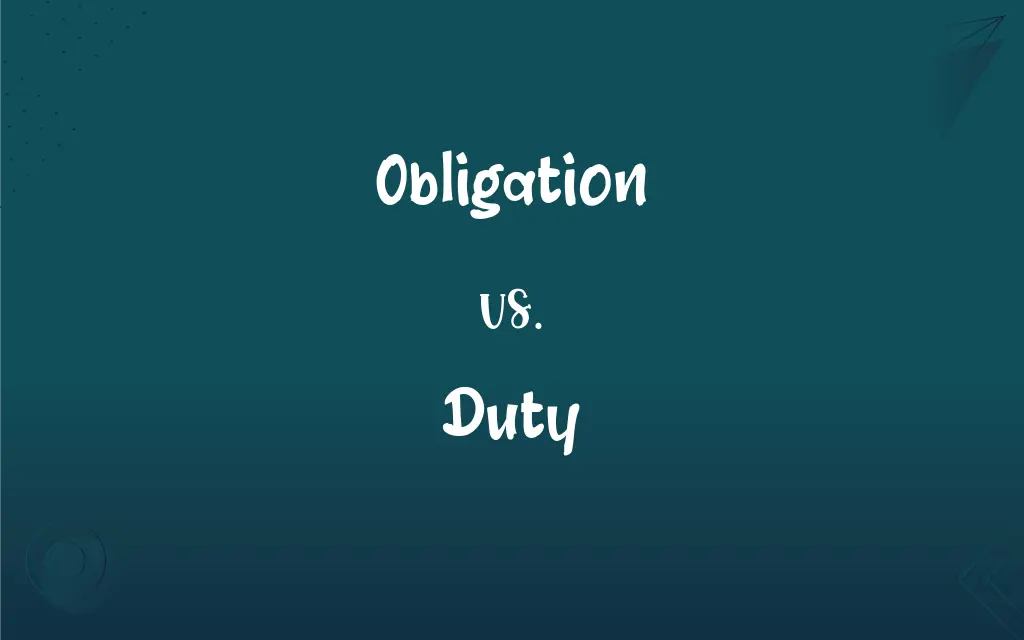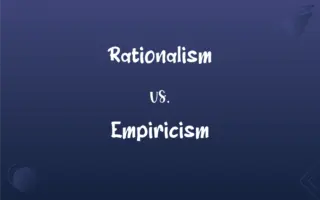Obligation vs. Duty: What's the Difference?
Edited by Harlon Moss || By Janet White || Published on December 30, 2023
Obligation is a requirement to act based on legal, moral, or personal reasons. Duty is a responsibility often linked to one's role, job, or societal norms.

Key Differences
Obligation often implies a sense of compulsion, a need to act or respond due to legal, moral, or personal reasons. Duty, in contrast, is more about a moral or ethical responsibility linked to one's role or position in society or a job.
In legal terms, an obligation is a binding agreement, enforceable by law, requiring a person to fulfill a commitment. Duty, however, can refer to a legal or moral responsibility that does not necessarily stem from a contract but from one's position or societal expectations.
Obligation is often personal and can be felt internally due to personal ethics, promises, or relationships. Duty is more external, frequently associated with professional roles, societal positions, or cultural norms, dictating certain behaviors or actions.
Obligations can be specific and situational, arising from particular circumstances like agreements or promises. Duties are broader, often continuous responsibilities that are inherent in a role, such as a citizen's duty to obey laws or a parent's duty to care for their child.
Breaking an obligation can lead to legal consequences or personal guilt, depending on the nature of the obligation. Failing to perform a duty often results in social, professional, or ethical repercussions, reflecting a failure to meet expected standards of conduct.
ADVERTISEMENT
Comparison Chart
Origin
Legal, moral, or personal compulsion
Role or societal expectations
Nature
Specific and situational
Broad and continuous
Enforcement
Legal or personal guilt
Social or professional repercussions
Examples
Contractual agreements, promises
Professional responsibilities, societal norms
Internal vs External
More internal and personal
More external and related to position
ADVERTISEMENT
Obligation and Duty Definitions
Obligation
A legal or moral requirement to do something.
She felt an obligation to repay the loan promptly.
Duty
Duty often refers to tasks or responsibilities associated with a job or role.
As a teacher, her duty was to inspire and educate her students.
Obligation
In law, an obligation is a binding contract enforceable by law.
Their business obligation required them to deliver products on time.
Duty
A moral or legal responsibility.
It was his duty to report the accident to the police.
Obligation
Obligation refers to a commitment or promise made to someone.
He had an obligation to attend the wedding as he had promised.
Duty
A societal expectation or norm.
Voting in elections is considered a civic duty.
Obligation
An obligation is a duty arising from a personal ethic or relationship.
Feeling an obligation to her friend, she offered support during tough times.
Duty
An obligation resulting from one's position or status.
As a parent, her primary duty was to ensure her children's safety.
Obligation
A personal sense of responsibility towards someone or something.
She felt a deep obligation to care for the stray animals in her neighborhood.
Duty
In military or law enforcement, duty refers to an assigned task or mission.
The soldier was on duty at the border.
Obligation
A social, legal, or moral requirement, such as a duty, contract, or promise, that compels one to follow or avoid a particular course of action
Are you able to meet your obligations? I have an obligation to attend their wedding.
Duty
An act or a course of action that is required of one by position, social custom, law, or religion
The duties of being a critical care nurse.
Obligation
The constraining power of a promise, contract, law, or sense of duty
I felt no obligation to offer my advice.
Duty
Required action or service
Jury duty.
Beyond the call of duty.
FAQs
Can personal ethics create an obligation?
Yes, personal ethics can strongly influence one's sense of obligation.
Can an obligation be legally enforced?
Yes, especially if it arises from a contract or law.
Is duty subject to personal interpretation?
While subjective, duties are often guided by societal or professional standards.
What defines an obligation?
A requirement to act based on legal, moral, or personal reasons.
Is duty always related to one's profession?
Not always, it can also be societal or familial.
Are duties generally universal?
Many duties, like obeying laws, are universal, but others can be role-specific.
Are duties consistent across cultures?
Some duties are culturally specific, while others are more universal.
How is duty linked to citizenship?
Citizens have duties like obeying laws and participating in civic activities.
How is duty defined?
A responsibility often linked to one's role, job, or societal norms.
Does breaking an obligation have consequences?
Yes, either legal, social, or personal, depending on the obligation.
How does one acquire an obligation?
Through agreements, relationships, legal requirements, or personal ethics.
Is fulfilling an obligation always mandatory?
Often it is, especially if it's legal or moral, but some obligations can be renegotiated.
Do professionals have specific duties?
Yes, professionals have duties specific to their field and role.
Can an obligation become a duty?
Yes, over time, certain obligations can evolve into more recognized duties.
Can obligations change over time?
Yes, obligations can evolve with changing circumstances or relationships.
Can an obligation be emotional?
Yes, emotional obligations arise from personal relationships and feelings.
Are duties inherent or acquired?
Some duties are inherent (like parental duties), while others are acquired (like job responsibilities).
Can a duty be delegated?
Some duties can be delegated, but others, like personal responsibilities, cannot.
What happens if a duty is ignored?
Ignoring a duty can lead to social, ethical, or professional consequences.
Can obligations be conflicting?
Yes, individuals can face conflicting obligations in complex situations.
About Author
Written by
Janet WhiteJanet White has been an esteemed writer and blogger for Difference Wiki. Holding a Master's degree in Science and Medical Journalism from the prestigious Boston University, she has consistently demonstrated her expertise and passion for her field. When she's not immersed in her work, Janet relishes her time exercising, delving into a good book, and cherishing moments with friends and family.
Edited by
Harlon MossHarlon is a seasoned quality moderator and accomplished content writer for Difference Wiki. An alumnus of the prestigious University of California, he earned his degree in Computer Science. Leveraging his academic background, Harlon brings a meticulous and informed perspective to his work, ensuring content accuracy and excellence.







































































